英语复习资料U5T2
仁爱英语八下期末U5T2复习
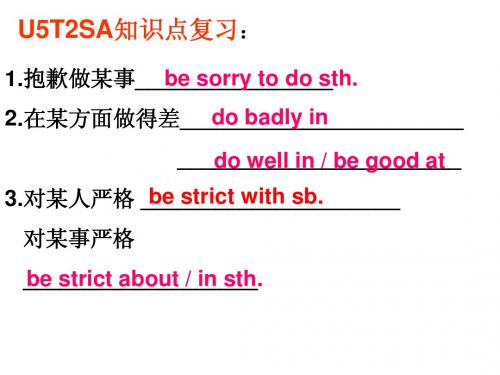
be sorry to do sth. 1.抱歉做某事________________ do badly in 2.在某方面做得差_______________________ _______________________ do well in / be good at be strict with sb. 3.对某人严格 _____________________ 对某事严格
Grammar focus
Adverbial clauses of reason
She is crying in the bathroom because she
did badly in the English exam.
She feels very lonely because she has no
U5T2SD知识点复习:
all the time 1.一直________________ it’s normal to do sth. 2.做…很正常_______________________ refuse to do sth. 3.拒绝做某事_______________________ be angry with / at sb. 4.对某人生气 _____________________ 5.对某事生气 be angry about sth. ___________________ =even if 即使 6. even though___________________
friends to talk with.
I’m feeling really sad because I failed the
English exam.
Equal comparison I live as happily as before. Qiqi is as lovely as I. But I am not as/so brave as Qiqi.
九年级上册英语U5T2知识点

九年级上册英语U5T2知识点Unit 5 Topic 2: Knowledge Points in Grade Nine EnglishIn the ninth grade, students are introduced to various knowledge points in their English curriculum. These knowledge points are essential for building a strong foundation in the language and ensuring effective communication. This article will explore some of the key knowledge points covered in Unit 5.1. Vocabulary ExpansionOne of the fundamental aspects of language learning is expanding vocabulary. In Unit 5, students encounter new words and phrases related to topics such as entertainment, hobbies, and preferences. For example, they learn words like "concert," "theatre," "instrument," and expressions such as "I'd love to" and "I'm not really into." Building a comprehensive vocabulary is crucial for expressing oneself accurately and comprehending various forms of communication.2. Grammar - Present Perfect TenseThe present perfect tense is a significant grammatical structure covered in Unit 5. This tense is used to discuss actions or situations that started in the past and have a connection to the present. Students learnto form sentences using the present perfect tense, such as "I have seen the movie" or "She has visited Paris." It helps them describe experiences, achievements, and events that occurred without specifying a precise time frame. Mastery of this tense expands their ability to talk about personal experiences and adds depth to conversations.3. Listening Skills - Understanding ConversationsUnit 5 focuses on developing students' listening skills by exposing them to various conversations between different individuals. These listening exercises enable students to understand the content, context, and emotions expressed in the conversations. By listening to dialogues about planning activities, discussing preferences, and making arrangements, students learn to comprehend spoken English in real-life situations. This practice enhances their overall ability to understand and respond effectively during verbal interactions.4. Reading Comprehension - Magazine ArticlesReading comprehension plays a crucial role in language proficiency. In Unit 5, students engage in reading various magazine articles, which introduces them to diverse forms of writing and enhances their comprehension skills. The articles cover topics like film reviews, book recommendations, and interviews with celebrities. These readings expose students to more advanced vocabulary, help them understanddifferent writing styles, and broaden their knowledge about various forms of entertainment.5. Writing - Personal Preferences and OpinionsUnit 5 also focuses on developing students' writing skills by encouraging them to express personal preferences and opinions. Students learn how to structure paragraphs, provide supporting details, and express their thoughts effectively. They engage in writing tasks such as film reviews, where they can share their opinions about a movie, provide a critique, and offer recommendations. By honing their ability to express ideas in writing, students become confident in presenting their thoughts to a larger audience.6. Speaking - Expressing Likes and DislikesThe ability to express likes and dislikes is an essential aspect of communication. In Unit 5, students learn how to articulate their preferences effectively during conversations. They engage in exercises that require them to discuss hobbies, entertainment choices, and favorite activities. By developing the skill of expressing likes and dislikes fluently, students enhance their conversational abilities and become more confident communicators.In conclusion, Unit 5 of the ninth-grade English curriculum covers crucial knowledge points that are integral to language development. By expanding vocabulary, mastering grammar structures, improving listening and reading comprehension, and honing writing and speaking skills, students become proficient language users. These knowledge points not only enhance their ability to communicate effectively in English but also lay the foundation for future language learning and personal growth.。
仁爱版英语八年级U5T2知识点

仁爱版英语八年级U5T2知识点在仁爱版英语八年级的Unit 5中,第二个Task包含了一些重要的英语知识点。
以下是这一部分知识点的详细介绍。
1. 一般过去时一般过去时指过去某个时间做的动作或存在的状态。
构成方式为动词过去式。
例如:I studied for three hours yesterday.(我昨天学习了三个小时)They played soccer in the park last weekend.(他们上个周末在公园里踢足球)2. 时间状语时间状语用于表示动作发生的时间。
常见的时间状语有:yesterday(昨天)、last week(上个星期)、at 5 o'clock(在五点钟)、in 1999(在1999年)等。
例如:I met my old friend yesterday.(我昨天见到了我的老朋友)She didn't go to school last Monday.(她上个星期一没有去上学)3. 接替代词接替代词用于代替前面提到的名词,以避免重复。
常见的接替代词有:it(它)、them(它们)、him(他)、her(她)等。
例如:I saw a movie yesterday. It was very interesting.(我昨天看了一部电影,很有趣)Tom and Jack played basketball yesterday. Jack beat him.(汤姆和杰克昨天打篮球,杰克打败了他)4. 常用短语常用短语是指日常生活中经常使用的词组。
八年级的Unit 5T2中介绍了一些常用的短语,例如:go to the cinema(去电影院)have a great time(过得很愉快)get on well(相处融洽)be fond of(喜欢)be interested in(对…感兴趣)以上就是八年级英语Unit 5T2的知识点介绍。
通过学习这些知识点,我们能够更好地掌握英语的日常表达,提高自己的语言能力。
仁爱英语U5T2复习课件

19. 积极参加
22.推翻,击垮
20.受某人的欢迎
23.中国历史
21. 充满
24.歼灭
ቤተ መጻሕፍቲ ባይዱ
25.在2000年的春天 27.长征
26. 面对…的危险 29.生活条件
28.成功做某事
30. 孔子的名言(至少会背3条)
31.定语从句。
用所给单词的适当形式填空
1. Uncle Tang can make his kite ____ (fly) higher in the sky but we can’t. 2. Can’t you see some of the boys ____ (play) in the garden? 3. The Browns enjoy ____ (live) in Shanghai very much. 4. Bill only spent two minutes ____ (mend) my bike. 5. Have you finished ____ (read) the newspaper to the blind man? 6. One of the girls forgot ____ (wear) the school uniform. 7. The line was bad, so he asked me _____ (speak) more loudly. 8. Why don’t you tell him ____ (do) it as soon as possible? 9. When class began, we stopped ____ (listen) to the teacher carefully. 10. He found it hard ____ (get) to sleep because the boys were making loud noises next door.
仁爱九年级英语U5t2知识点
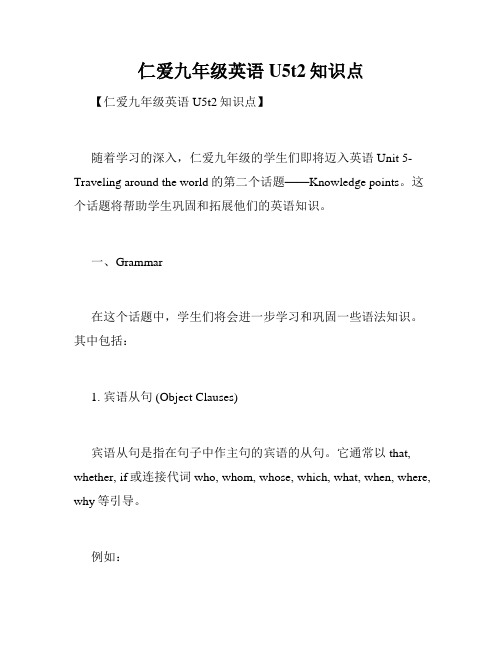
仁爱九年级英语U5t2知识点【仁爱九年级英语U5t2知识点】随着学习的深入,仁爱九年级的学生们即将迈入英语Unit 5- Traveling around the world的第二个话题——Knowledge points。
这个话题将帮助学生巩固和拓展他们的英语知识。
一、Grammar在这个话题中,学生们将会进一步学习和巩固一些语法知识。
其中包括:1. 宾语从句 (Object Clauses)宾语从句是指在句子中作主句的宾语的从句。
它通常以that, whether, if或连接代词who, whom, whose, which, what, when, where, why等引导。
例如:- I don't know if he will come to the party.(我不知道他是否会来参加派对。
)- She asked me where I was from.(她问我来自哪里。
)学生们需要通过大量的练习,理解和掌握宾语从句的用法。
2. 条件状语从句 (Conditional Clauses)条件状语从句表示某事发生的条件。
它通常以if或unless引导。
例如:- If it rains tomorrow, we will stay at home.(如果明天下雨,我们将呆在家里。
)- Unless you work hard, you won't pass the exam. (如果你不努力学习,你就通不过考试。
)这个语法知识点需要学生们熟练掌握,因为它在描述条件和假设时经常被使用。
3. 过去完成时 (Past Perfect Tense)过去完成时用于表示在过去某一时间之前已经发生的动作或存在的状态。
它通常与时间状语by, before, already等连用。
例如:- I had finished my homework before my mom came back.(我在我妈妈回来之前已经做完了作业。
七年级仁爱英语u5t2知识点
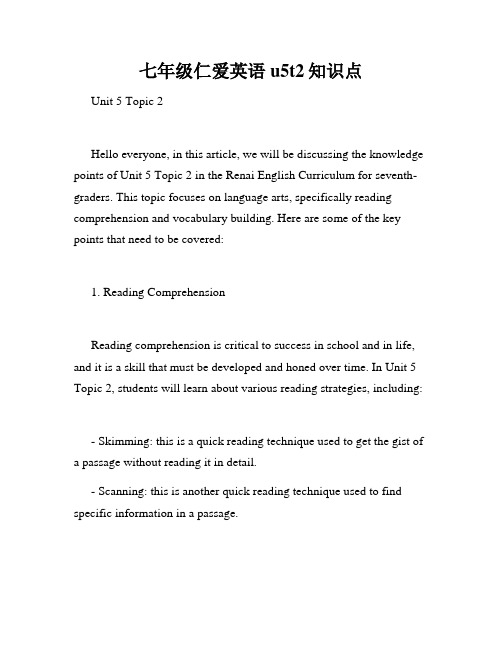
七年级仁爱英语u5t2知识点Unit 5 Topic 2Hello everyone, in this article, we will be discussing the knowledge points of Unit 5 Topic 2 in the Renai English Curriculum for seventh-graders. This topic focuses on language arts, specifically reading comprehension and vocabulary building. Here are some of the key points that need to be covered:1. Reading ComprehensionReading comprehension is critical to success in school and in life, and it is a skill that must be developed and honed over time. In Unit 5 Topic 2, students will learn about various reading strategies, including:- Skimming: this is a quick reading technique used to get the gist of a passage without reading it in detail.- Scanning: this is another quick reading technique used to find specific information in a passage.- Close reading: this is a technique where students read a passage slowly and carefully, paying attention to every word and trying to understand the deeper meaning of the text.Students will also learn about the different types of questions that can be asked about a passage, including:- Literal questions: these questions require students to recall information directly from the text.- Inferential questions: these questions require students to use their critical thinking skills to make connections and draw conclusions based on the information in the text.- Evaluative questions: these questions require students to make judgments based on the information in the text.2. Vocabulary BuildingA robust vocabulary is essential for success in language arts classes, as well as in many other areas of life. In Unit 5 Topic 2, students will learn about different strategies for building their vocabulary, including:- Context clues: using the words and phrases surrounding an unfamiliar word to figure out its meaning.- Root words: understanding the meanings of common prefixes and suffixes can help students decipher the meanings of unfamiliar words.- Dictionaries and thesauruses: these tools can be used to look up unfamiliar words, as well as to find synonyms and antonyms for words students already know.Students will also learn about the different types of vocabulary words, including:- Tier 1 words: these are basic, everyday words, such as "dog," "cat," and "house."- Tier 2 words: these are more sophisticated and academic words, such as "analysis," "serendipitous," and "ameliorate."- Tier 3 words: these are subject-specific words that are used in specific areas of study, such as "photosynthesis," "isotope," and "plate tectonics."In conclusion, Unit 5 Topic 2 of the Renai English Curriculum for seventh-graders is a crucial part of the Language Arts syllabus. It focuses on two essential skills: reading comprehension and vocabularybuilding. By learning the different reading strategies and vocabulary-building techniques covered in this unit, students can improve their critical thinking skills, enhance their writing abilities, and gain the confidence needed to succeed in school and beyond.。
仁爱版八年级英语下册unit5Topic2复习

考点一:
句型1:as+形容词原形+as This jacket is as beautiful as that one.
English is as interesting as Chinese.
•习惯于(做)某事 •我多么希望去做某事
•
be/get used to (doing)sth
• How I wish to do sth.
• 重点句型: • 我不习惯这的一切。
• 1.I was not used to everything here • 我认为这里的路不如我们家乡的干净。. • 2.I thought the roads here were not so clean
2Everyone gets these feelings at your age. 好啦!好啦!一切都会好起来。
3There, there! It’ll be OK.
SectionC
•光阴似箭
• How time flies!
•而且
• What’s more
•过去常常做某事 • used to do sth
be + adj. + prep. 大搜索
good/bad at
(不)擅长于
good/bad for 对……有益/害
worried about 为……担心
strict with
对某人要求严格
pleased with 对……很高兴
be afraid of
对……害怕
sorry for
为……难过
interested in 对……感兴趣
九年级下册英语仁爱版u5t2知识点
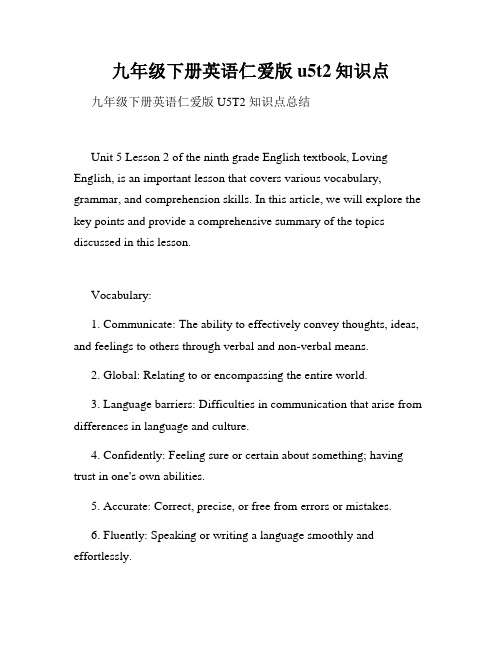
九年级下册英语仁爱版u5t2知识点九年级下册英语仁爱版U5T2 知识点总结Unit 5 Lesson 2 of the ninth grade English textbook, Loving English, is an important lesson that covers various vocabulary, grammar, and comprehension skills. In this article, we will explore the key points and provide a comprehensive summary of the topics discussed in this lesson.Vocabulary:1. Communicate: The ability to effectively convey thoughts, ideas, and feelings to others through verbal and non-verbal means.2. Global: Relating to or encompassing the entire world.3. Language barriers: Difficulties in communication that arise from differences in language and culture.4. Confidently: Feeling sure or certain about something; having trust in one's own abilities.5. Accurate: Correct, precise, or free from errors or mistakes.6. Fluently: Speaking or writing a language smoothly and effortlessly.7. Native speaker: A person who has learned and speaks a language from birth.Grammar:1. Modal verbs: Modal verbs are auxiliary verbs that express a range of possibilities, including ability, possibility, permission, and obligation. Examples include 'can', 'could', 'may', 'might', 'must', 'shall', 'should', 'will', 'would'.2. Making suggestions: Offering ideas or recommendations for consideration. Common expressions used for making suggestions are 'Why don't we...', 'Let's...', 'How about...', 'Shall we...', etc.Listening Skills:1. Listening for specific information: Listening attentively to extract specific details or answers to questions.2. Understanding main ideas: The central or most important points of a listening passage.3. Inferring meaning: Deducing or understanding the implied meaning or intention of a speaker.Speaking Skills:1. Expressing opinions: Sharing one's viewpoint or personal thoughts on a particular topic.2. Debating: Engaging in a discussion or argument on different perspectives of a topic.3. Describing graphs and charts: Providing a clear and organized explanation of the information presented in visual representations.Reading Skills:1. Skimming: Quickly looking over a text to get a general idea of its content.2. Scanning: Rapidly searching a text for specific information or keywords.3. Reading for details: Reading carefully to extract specific information or facts.4. Identifying context clues: Using information from the surrounding text to understand the meaning of unfamiliar words or phrases.Writing Skills:1. Narrative writing: A mode of writing that tells a story or recounts an event or experience.2. Expository writing: A type of writing that explains, describes, or informs.3. Writing a report: Providing information on a specific topic in an organized and cohesive manner.Overall, Unit 5 Lesson 2 of the ninth-grade English textbook covers a wide range of vocabulary, grammar, and language skills. By understanding and practicing these key points, students will be able to communicate more effectively, comprehend a variety of texts, and express themselves confidently in both spoken and written English.。
2020七年级下册英语u5T2知识点
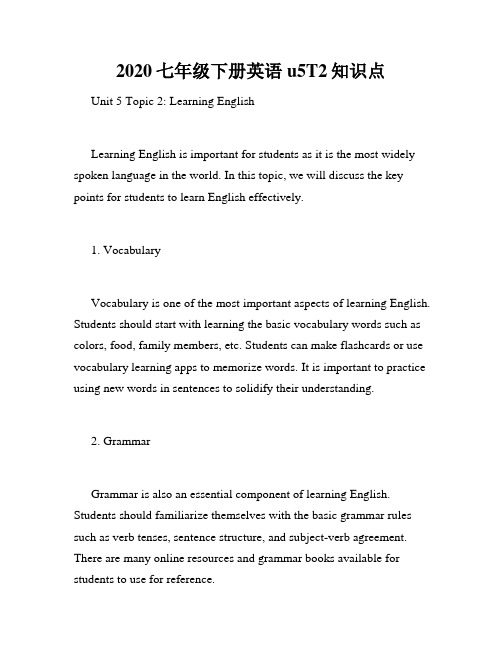
2020七年级下册英语u5T2知识点Unit 5 Topic 2: Learning EnglishLearning English is important for students as it is the most widely spoken language in the world. In this topic, we will discuss the key points for students to learn English effectively.1. VocabularyVocabulary is one of the most important aspects of learning English. Students should start with learning the basic vocabulary words such as colors, food, family members, etc. Students can make flashcards or use vocabulary learning apps to memorize words. It is important to practice using new words in sentences to solidify their understanding.2. GrammarGrammar is also an essential component of learning English. Students should familiarize themselves with the basic grammar rules such as verb tenses, sentence structure, and subject-verb agreement. There are many online resources and grammar books available for students to use for reference.3. Listening and SpeakingListening and speaking are also important skills to develop when learning English. Students should listen to English audio recordings and practice speaking with native speakers or classmates. This will help students improve their pronunciation and speaking skills.4. Reading and WritingReading and writing are crucial skills to develop when learning English. Students should read English books, magazines, or websites to improve their reading comprehension. They can also practice writing short paragraphs or essays to improve their writing skills.5. Practice, Practice, PracticePractice is key to mastering any skill, including learning English. Students should practice English every day, even if it is just for a few minutes. They can talk to themselves in English, write down their thoughts in English, or watch English videos to practice their skills.In conclusion, learning English takes time and effort, but it is an important skill to have. Students should focus on building their vocabulary, grammar, listening, speaking, reading, and writing skills through consistent practice and dedication.。
七年级英语U5T2总结知识点
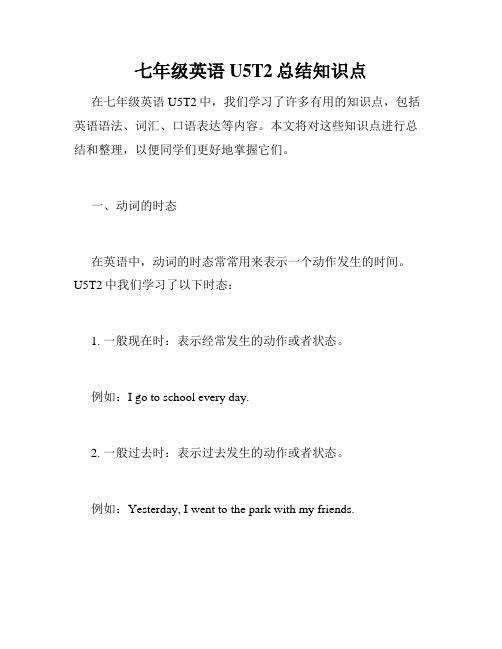
七年级英语U5T2总结知识点在七年级英语U5T2中,我们学习了许多有用的知识点,包括英语语法、词汇、口语表达等内容。
本文将对这些知识点进行总结和整理,以便同学们更好地掌握它们。
一、动词的时态在英语中,动词的时态常常用来表示一个动作发生的时间。
U5T2中我们学习了以下时态:1. 一般现在时:表示经常发生的动作或者状态。
例如:I go to school every day.2. 一般过去时:表示过去发生的动作或者状态。
例如:Yesterday, I went to the park with my friends.3. 现在进行时:表示现在正在发生的动作,通常用来描述当前的情况。
例如:I am reading a book now.二、句型结构在U5T2中,我们也学习了一些句型结构,用来帮助我们更准确地表达自己的意思。
1. 对…进行描述例如:He is tall and handsome.2. 表示建议和请求例如:Can you help me with my homework?3. 询问和回答例如:What time is it? It's 2 o'clock.三、重点词汇除了语法和句型结构,我们还需要学习大量的词汇,以便能够更好地理解和表达英语。
1. 食物类词汇在U5T2中,我们学习了许多食物类的词汇,包括hamburger、pizza、noodles等等。
2. 时间类词汇我们还学习了一些表示时间的词汇,包括hours、minutes、seconds、weeks、months等等。
3. 人物类词汇在U5T2中,我们也学习了一些人物类的词汇,包括teacher、nurse、doctor、student等等。
四、口语表达最后一个重要的知识点就是口语表达。
U5T2中,我们学习了如何用英语进行日常对话,包括问候、介绍自己、询问他人情况等等。
总结在本次U5T2的学习中,我们学习了很多有用的英语知识点,包括动词的时态、句型结构、词汇和口语表达等。
Unit 5 Topic 2综合复习课件仁爱版英语八年级下册

(完型常考)
重点单词及用法回顾 e use sth to do sth 使用某物做某事 used to do sth 过去常常做某事 be used to doing sth习惯于做某事 useful-useless
课后习题 语篇填空 Dear Doctor Chen,
I think I am in trouble(麻烦). I am not good-looking and clever. I think nobody
likes me,1. _s__o___I usually felt bad. Sometimes I think if I leave home,nobody will
2.be strict with sb.
3.feel-felt feeling n.感情;感觉
4.joke n.玩笑 play jokes on sb.
重点单词及用法回顾 ual-usually as usual 像往常一样 相当于usually
6.either...or... 或者...或者...;要么...要么...
9.deal(dealt) deal with sth.
10.unfair 阅读可能会遇到 “不公平的”
02 重点词组及句子默写检测
重点词组及句子默写检测
重点词组及句子默写检测
重点词组及句子默写检测
重点词组及句子默写检测
03 语法攻克
语难点:区别 because和because of
仁爱版八年级下册 U5T2复习
目录Contents
01 重点单词及用法回顾 02 重点词组及句子默写检测
七年级下册仁爱英语U5T2知识点
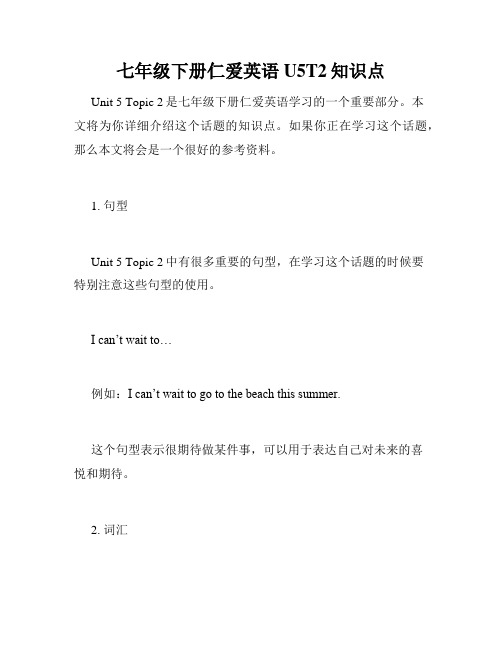
七年级下册仁爱英语U5T2知识点Unit 5 Topic 2是七年级下册仁爱英语学习的一个重要部分。
本文将为你详细介绍这个话题的知识点。
如果你正在学习这个话题,那么本文将会是一个很好的参考资料。
1. 句型Unit 5 Topic 2中有很多重要的句型,在学习这个话题的时候要特别注意这些句型的使用。
I can’t wait to…例如:I can’t wait to go to the beach this summer.这个句型表示很期待做某件事,可以用于表达自己对未来的喜悦和期待。
2. 词汇学习英语的时候,积累词汇是非常重要的。
下面是一些与Unit 5 Topic 2相关的词汇:Beach –海滩Swim –游泳Sun –太阳Sand –沙子Surf –冲浪Vacation –假期3. 语法学习语法也是非常重要的。
下面是一些与Unit 5 Topic 2相关的语法知识:现在进行时例如:I am swimming in the ocean.现在进行时表示正在进行的动作。
在这个话题中,现在进行时可以用于描述正在进行的活动,比如游泳、冲浪等等。
4. 生词在学习知识点的时候,遇到生词是非常正常的。
下面是一些在Unit 5 Topic 2中可能会出现的生词:Coast –海岸Waves –浪Cool –凉爽的Towel –毛巾Umbrella –伞以上就是关于七年级下册仁爱英语U5T2知识点的详细介绍。
重要的句型、词汇、语法和生词都被列举出来了。
如果你正在学习这个话题,那么就要认真地学习这些知识点,努力提高自己的英语水平。
七年级英语u5t2知识点
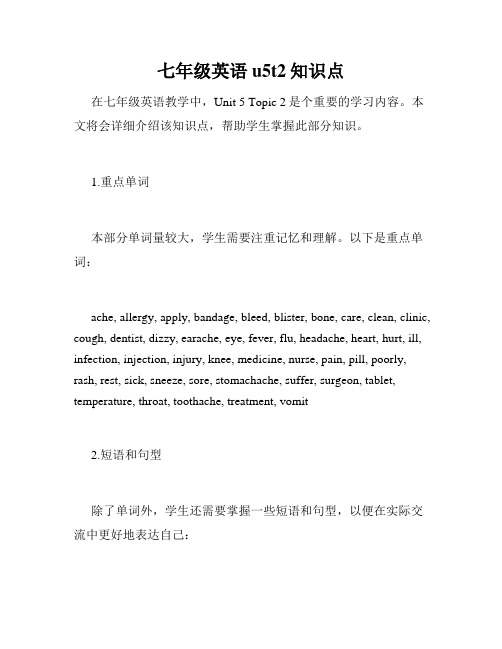
七年级英语u5t2知识点在七年级英语教学中,Unit 5 Topic 2是个重要的学习内容。
本文将会详细介绍该知识点,帮助学生掌握此部分知识。
1.重点单词本部分单词量较大,学生需要注重记忆和理解。
以下是重点单词:ache, allergy, apply, bandage, bleed, blister, bone, care, clean, clinic, cough, dentist, dizzy, earache, eye, fever, flu, headache, heart, hurt, ill, infection, injection, injury, knee, medicine, nurse, pain, pill, poorly, rash, rest, sick, sneeze, sore, stomachache, suffer, surgeon, tablet, temperature, throat, toothache, treatment, vomit2.短语和句型除了单词外,学生还需要掌握一些短语和句型,以便在实际交流中更好地表达自己:- Are you feeling better?- Can I help you?- How long have you had this pain?- I have a headache/stomachache/earache.- I need to see a doctor.- I'm feeling sick/poorly.- What's your temperature?- Where does it hurt?- You need to rest.- You should take some medicine.3.病症和治疗在学习短语和句型的基础上,学生还需要了解不同的病症和治疗方法。
以下是一些常见的病症及其常见的治疗方法:- 头痛:take a painkiller.- 感冒:rest, drink plenty of water, take some medicine.- 发烧:take a temperature, rest, drink plenty of water, take some medicine.- 喉咙痛:gargle with salt water, take some medicine.- 肚子痛:rest, drink warm water, avoid spicy food.- 晕眩:lie down and rest, avoid sudden movements, drink some water.- 牙痛:brush teeth, take some painkillers, see a dentist if necessary.- 骨折:get an X-ray, see a surgeon, wear a cast.4.常用缩写和简写在实际医疗卫生场景中,医生和护士常常使用缩写和简写,学生需要掌握其中常用的:- bpm:beats per minute (每分钟心跳数)- cc:cubic centimeter (立方厘米)- mg:milligram (毫克)- ml:milliliter (毫升)- OTC:over the counter (非处方药)- Rx:prescription (处方)5.阅读和交流技巧除了以上具体的知识点外,学生还需要掌握阅读和交流技巧,以便在实际中更好地理解和表达:- 阅读时要注意文章的结构,关注关键词和术语。
Unit5Topic2
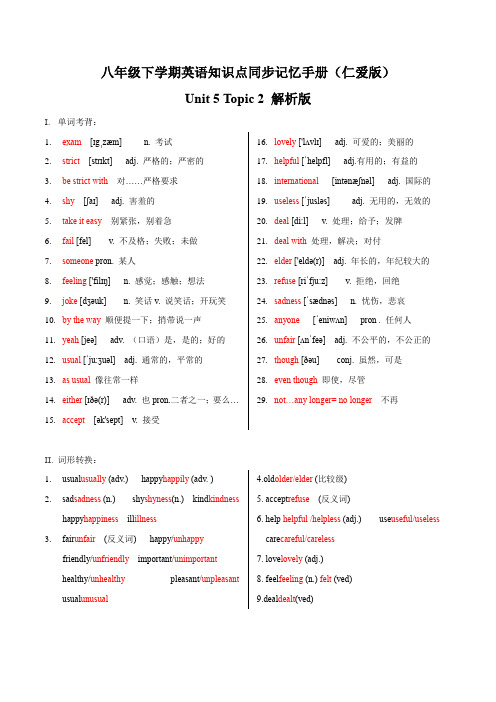
八年级下学期英语知识点同步记忆手册(仁爱版)Unit 5 Topic 2 解析版I.单词考背:1.exam[ɪgˌzæm] n. 考试2.strict[strɪkt] adj. 严格的;严密的3.be strict with对……严格要求4.shy [ʃaɪ] adj. 害羞的5.take it easy别紧张,别着急6.fail [fel] v. 不及格;失败;未做7.someone pron. 某人8.feeling ['filɪŋ] n. 感觉;感触;想法9.joke [dʒəuk] n. 笑话v. 说笑话;开玩笑10.by the way顺便提一下;捎带说一声11.yeah [jeə] adv. (口语)是,是的;好的ual [ˈju:ʒuəl] adj. 通常的,平常的13.as usual 像往常一样14.either [ɪðə(r)] adv. 也pron.二者之一;要么…15.accept[ək'sept] v. 接受16.lovely ['lʌvlɪ] adj. 可爱的;美丽的17.helpful [ˈhelpfl] adj.有用的;有益的18.international [intənæʃnəl] adj. 国际的eless [ˈjusləs] adj. 无用的,无效的20.deal [di:l] v. 处理;给予;发牌21.deal with 处理,解决;对付22.elder ['eldə(r)] adj. 年长的,年纪较大的23.refuse [riˈfju:z] v. 拒绝,回绝24.sadness [ˈsædnəs] n. 忧伤,悲哀25.anyone[ˈeniwʌn] pron . 任何人26.unfair [ʌnˈfeə] adj. 不公平的,不公正的27.though [ðəu] conj. 虽然,可是28.even though即使,尽管29.not…any longer= no longer不再II.词形转换:ual usually (adv.) happy happily (adv. )2.sad sadness (n.)shy shyness(n.) kind kindnesshappy happiness ill illness3.fair unfair (反义词) happy/unhappyfriendly/unfriendly important/unimportanthealthy/unhealthy pleasant/unpleasant usual unusual 4.old older/elder (比较级)5. accept refuse(反义词)6. help helpful /helpless (adj.) use useful/useless care careful/careless7. love lovely (adj.)8. feel feeling (n.) felt (ved)9.deal dealt(ved)III.短语罗列:1.看起来担心look worried2.在某方面做得不好do badly in=be weak/poor in3.对......严格be strict with4.与某人聊天have a talk with=talk with5 .谢谢做某事thank you for doing sth.6.对.....担心be worried about =worry about7.参加考试take/ have an exam8.考试不及格fail the exam9.未能做到fail to do sth.10.在某人这样的年龄时at one’s age11.给某人讲笑话tell sb. jokes12.别紧张take it easy13.顺便提一下by the way14.像往常一样as usual 15.做某事有困难have problems with16.光阴似箭!How time flies!17.习惯于……be/get used to (doing) sth.18.而且what's more19.更糟糕的是what's worse20.最糟糕的是worst of all21.害怕做某事be afraid to do sth./be afraid of doing sth.22.处理deal with/do with23.拒绝做某事refuse to do sth.24.生某人的气be angry with25.即使even though/even if26.不再not...any longer/no longernot ...any more/ no moreIV.句型运用:1.What seems to be the problems?到底是怎么回事?2.How are you feeling today?你今天感觉怎么样?3.I was really upset and lonely.我感觉又难过又寂寞。
仁爱版八年级下册U5T2知识点
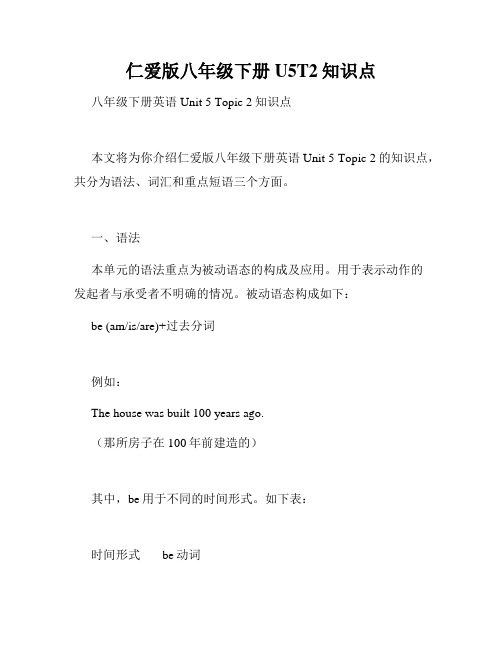
仁爱版八年级下册U5T2知识点八年级下册英语Unit 5 Topic 2知识点本文将为你介绍仁爱版八年级下册英语Unit 5 Topic 2的知识点,共分为语法、词汇和重点短语三个方面。
一、语法本单元的语法重点为被动语态的构成及应用。
用于表示动作的发起者与承受者不明确的情况。
被动语态构成如下:be (am/is/are)+过去分词例如:The house was built 100 years ago.(那所房子在100年前建造的)其中,be用于不同的时间形式。
如下表:时间形式be动词现在时am/is/are过去时was/were将来时will be完成时have/has been将来完成时will have been例句:The books have been sent to the library.(那些书已经被送到了图书馆)二、词汇本单元词汇主要涉及人际关系、社会热点、家庭、学校及生活等方面。
如下列出一些重点词汇:1.社交网络:social network2.学业成绩:academic performance3.与某人取得联系:get in touch with sb.4.虚拟世界:virtual world5.改善:improve6.增强:enhance7.教育体制:educational system8.社会责任:social responsibility9.家庭作业:homework10.课外活动:extracurricular activities三、重点短语1.远离:keep away from2.在社交媒体上:on social media3.与…保持联系:keep in touch with4.沉迷:get addicted to5.考虑某事:take sth. into consideration6.适应新环境:adapt to the new environment7.充实的生活:fulfilling life8.老师的评价:teacher's assessment9.因…而感到沮丧:feel frustrated because of10.与…沟通:communicate with综上所述,本文介绍了仁爱版八年级下册英语Unit 5 Topic 2的语法、词汇和重点短语。
八年级下学期仁爱英语U5T2复习提纲
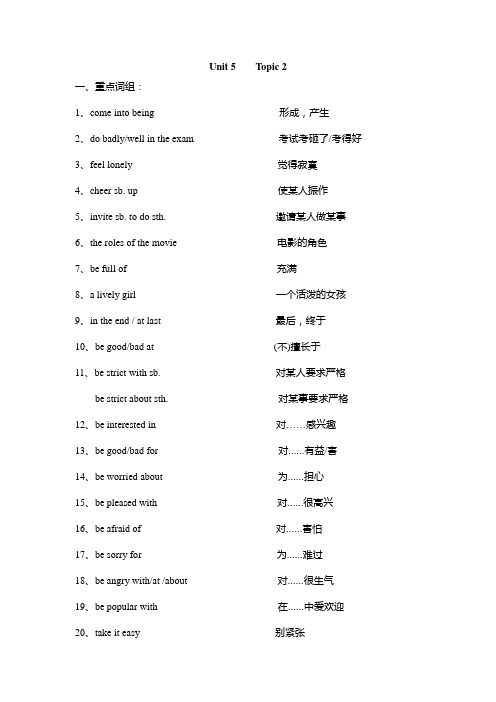
Unit 5 Topic 2一、重点词组:1、come into being 形成,产生2、do badly/well in the exam 考试考砸了/考得好3、feel lonely 觉得寂寞4、cheer sb. up 使某人振作5、invite sb. to do sth. 邀请某人做某事6、the roles of the movie 电影的角色7、be full of 充满8、a lively girl 一个活泼的女孩9、in the end / at last 最后,终于10、be good/bad at (不)擅长于11、be strict with sb. 对某人要求严格be strict about sth. 对某事要求严格12、be interested in 对……感兴趣13、be good/bad for 对……有益/害14、be worried about 为……担心15、be pleased with 对……很高兴16、be afraid of 对……害怕17、be sorry for 为……难过18、be angry with/at /about 对……很生气19、be popular with 在……中爱欢迎20、take it easy 别紧张21、fail the exam 不及格22、at one’s age 在某人这样的年龄时23、tell sb. jokes 给某人讲笑话24、by the way 顺便提一下25、be/get used to (doing) sth. 习惯于……26、not as/so …as…不如…27、as usual 像往常一样28、take / have an exam 参加考试29、have problems with sth. 做某事有困难30、deal with sadness 处理悲伤31、elder brother 哥哥32、refuse to do sth. 拒绝做某事33、even though 尽管,即使34、no longer / not …any longer 不再35、learn …from 向……学习二、重点句型1、What seems to be the problem? 出了什么问题?2、She is very strict with herself. 她对自己要求非常严格。
U5T2知识点
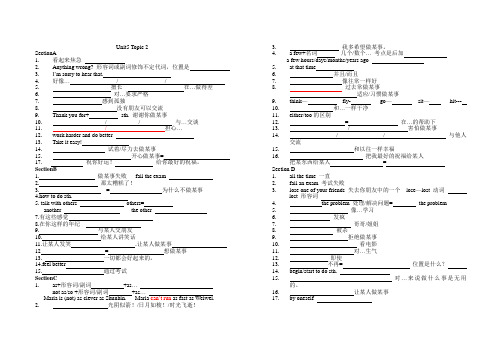
Unit5 Topic 2SectionA1.看起来焦急2.Anything wrong? 形容词或副词修饰不定代词,位置是3.I’m sorry to hear that.4.好像…/ /5.擅长在…做得差6.对…要求严格7.感到孤独8.没有朋友可以交流9.Thank you for+ sth. 谢谢你做某事10./ / 与…交谈11./ 担心…12.work harder and do better13.Take it easy!14.试着/尽力去做某事15.开心做某事=17. 祝你好运!给你最好的祝福。
SectionB1. 做某事失败fail the exam2. 那太糟糕了!3. = 为什么不做某事4.how to do sth.5. talk with others others=another the other7.有这些感觉8.在你这样的年纪9. 与某人交朋友10. 给某人讲笑话11.让某人发笑.让某人做某事12 = 想做某事13. 一切都会好起来的。
14.feel better15. 通过考试SectionC1.as+形容词/副词+as…not as/so +形容词/副词+as…Maria is (not) as clever as Shunbin. Maria can’t run as fast as Weiwei.2.光阴似箭!/日月如梭!/时光飞逝!3.我多希望做某事。
4. a few+名词几个/数个…考点是后加a few hours/days/months/years ago5.at that time6.并且/而且7.像往常一样好8.过去常做某事适应/习惯做某事9.think—fly- go—sit—hit---10.和…一样干净11.either/too的区别12.= 在…的帮助下13./ 害怕做某事14./ / 与他人交流15.和以往一样幸福16.把我最好的祝福给某人把某东西给某人=Section D1.all the time 一直2.fail an exam 考试失败3.lose one of your friends 失去你朋友中的一个lose—lost 动词lost 形容词4.the problem 处理/解决问题= the problem5.像…学习6.发疯7.哥哥/姐姐8.被杀9.拒绝做某事10.看电影11.对…生气12.即使13.不再= 位置是什么?14.begin/start to do sth.15.对…来说做什么事是无用的。
- 1、下载文档前请自行甄别文档内容的完整性,平台不提供额外的编辑、内容补充、找答案等附加服务。
- 2、"仅部分预览"的文档,不可在线预览部分如存在完整性等问题,可反馈申请退款(可完整预览的文档不适用该条件!)。
- 3、如文档侵犯您的权益,请联系客服反馈,我们会尽快为您处理(人工客服工作时间:9:00-18:30)。
(Li Ming and Kangkang are in the school
library.)
L: Excuse me, may I borrow some English
= Sure. workbooks? use vt.
G: Of course. Many students are using them .
1.
borrow
borrow sth
借入
borrow sth. from sb.
1) 我可以借用你的橡皮擦吗? Could I borrow your eraser? 2)我经常从图书馆借书。 I often borrow books from the library. 3) 李明经常向我借书。 Li Ming often borrows books from me.
英语复习资料 U5T2
林婧雯
SectionA
M: Hello, Jane! This is Michael. What are you doing now? J: Guess! M: Are you doing your homework? J: No, I’m not. M: Are you watching TV? 制作卡片 J: Yes, I am. What about you? 无聊的 M: I’m making cards, but it’s boring. Would you like to play basketball? J: Good idea! See you soon. M: See you. 1a
Wen Wei is my good friend. Here are some
双重所有格
ቤተ መጻሕፍቲ ባይዱ
photos of his. Look! He is running in the gym in Picture 1. In Picture 2, he is swimming in a swimming pool. He looks happy because he loves
= some day 将来的某一天
1. some photos of his photos of his 双重所有格,his 在此用作名词性物主代 词。 some books of mine 我的一些书 a classmate of hers 她的一个同学 many friends of Kangkang’s 康康的很多朋友 2. because 因为 so 所以
2) return to +地点
4. on time 准时 in time 及时 on_________. time Students must go to school in time The doctor saves his life___________. 5. look for v.寻找(强调过程,动作) find v.找到(强调结果) e.g. 她正寻找她的钱包,但她找不到。 She is looking for her wallet, but she can’t find it. looking for 1) What are you ______________? 2) What’s up? find I can’t __________ my pen.
borrow sth. (from…)
1. borrow 借入
我跟我同学借了本英语书。 borrow an English book from
I ________________________my classmate.
(The girl looks for the books on the shelves.) G: Here you are. 寻找 shelf 保有, 保管 L: Great! How long can I keep them? 准时 G: Two weeks. You must return them on time. L: Sure, I will. Thank you. 情态动词, 后接动词原形 G: You’re welcome. K: Excuse me, do you have any English newspapers? G: Sorry, we don’t have any. K: Thank you all the same. Bye! G: Bye!
• • • • • • • • • • •
in the school library 在学校图书馆 借些英语练习册 borrow some English workboo Of course. 当然。 keep the books for two weeks 借那些书两周 look for the books on the shel 在架子上找书 return them on time 及时返还它们 How long can I keep them? 我能借它们多久? talk at the Lost and Found 在失物招领处说话 my family photo 我的全家福 找不到他的钱包 can’t find his wallet the number of his student car 学生卡的号码
2. keep保存;保留;保持; +for + 一段时间
-这些书我能借用多久? -你可以借两个星期。 -How long can I keep the books?
-You can keep them for two weeks.
3. return 归还 =give sth. back 1) return sth. return sth. to sb. Eg:归还那本书 return the book = give the book back 归还他们 return them = give them back 你必须按时把它还给我。 You must return it to me on time.
(In the gym) Three students are swimming in the swimming pool. What about the girls over there? Oh! 在那边 They are dancing. 衣服在那里。 But Helen isn’t clothes are over there. dancing with them.The She is playing 那边的那个男的是我的老师。 The man over there is my teacher. ping-pong with Ann.
1. play basketball/soccer/pingpong/cards (用于球类、棋牌类) play +the+乐器 2. See you soon/later/then/tomorrow/next time/this afternoon. 3. boring adj. 无聊的,无趣的 这是本无聊的书。我不喜欢。 The book is boring. I don’t like it. =It’s a boring book. I don’t like it.
两者不可同时出现在同一个句子中。
因为那部电影无聊,所以我们不喜欢。 Because the movie is boring, we don’t like it. = The movie is boring, so we don’t like it. 3. also also与too表示“也”,also常用于句中,too 用于句末。 我是学生。他也是学生。 I’m a student. He is a student, too. =I’m a student. He is also a student.
制作卡片 在图书馆看书 在操场踢足球 在体育馆跳舞 打扫 在食堂吃午饭 在教室做作业 在实验室 在计算机房 在教师办公室 在教学楼上课 在游泳池游泳 电话聊天
make cards read (books) in the library play soccer on the playground dance in the gym do some cleaning have lunch in the dining hall do homework in the classroom in the lab in the computer room in the teachers’ office have classes in the classroom building swim in the swimming pool talk on the telephone
(In the classroom) Look at your =having classes classmates. They are not having lessons. Kangkang is reading English newspapers. Michael is doing his homework. Is Wang Wei doing his at the back of…在 …的后面 homework, too? Oh, no! He is writing a 在教室后面我们可以看到一个大黑板。 letter. What are Jane and Maria doing? We can see a big blackboard at the back They are talking. Where is Sally? Aha, of the classroom. she is cleaning the blackboard at the back of the classroom.
love doing sth. / like doing sth. =talk with 因为
swimming. In Picture 3, he is talking to a Japanese girl on the Great Wall. The Great Wall is wonderful. I also want to visit it one day.
